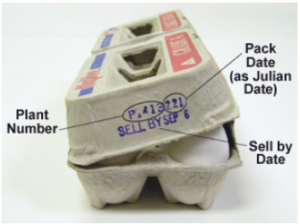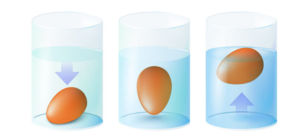Better Living for Texans: Let’s Get Crackin’
By Kelli Niemeier
Spring, egg hunts, candy, bunnies, and delicious family meals. These festive events are the hallmark of the month of April. With Easter coming up soon, it is important to remember some important food safety techniques to have a safe and happy holiday! A report by CNN News stated that Americans are “egg-spected” to purchase about 180 million eggs for consumption or decoration during the Easter season. That’s a whole lot of eggs! So, let’s get crackin’ on important things to remember when buying, storing, and cooking all those eggs!
Buying Eggs
When you’re buying eggs at the grocery store, always check the carton before you put it in your cart. Why? Bacteria from dirt or chicken droppings on the outside of the shell can enter the egg through cracks that are sometimes too fine to see. Before you purchase eggs, there are several steps to consider:

- Open the carton and check the eggs look clean and are not cracked before purchasing.
- Buy only eggs that are sold from a refrigerator or refrigerator case.
- Do not switch eggs from one carton to the other. Eggs are labeled according to the U.S. Department of Agriculture (USDA) with the location the eggs were processed. If you switch the eggs, you won’t know where the eggs are from or how they have been stored and handled.
- Check the expiration date and/or sell by date of your eggs before purchasing. The three-digit code after the plant number is the Julian Date of Pack. This number indicates the consecutive date of the year on which the eggs were packed. Example: Jan 1 = 001, July 1 = 182, and Dec 31 =365.
Following these tips before purchasing will ensure that you are buying eggs that will remain fresh!
How Long Should I Keep Eggs?

After you purchase your eggs, refrigerate the eggs in their original carton. Place the carton in the refrigerator, rather than in the door. For best quality, use your eggs within 3-5 weeks of the date you purchased them. Just because the ‘sell-by’ date has already passed does not mean your eggs are not safe to use. You may have heard of the tip to put your egg in a bowl of water to see if it is still fresh. You can simply add water to a bowl (enough to submerge an egg completely) and place it in the water. A fresh egg sinks, whereas an older egg will float. As time passes, eggs develop tiny pockets of air beneath the shell, so after time, the egg will float! An egg may float in water because it is older, but it still may be perfectly safe to use. Crack the egg into a bowl and look for an off-odor or unusual appearance.
Easter Egg Safety Tips
- If you’re having an Easter egg hunt, consider hiding places carefully. Avoid areas where the eggs might come into contact with pets, other animals, or lawn chemicals.
- Make sure you find all the eggs you’ve hidden and refrigerate them. Discard any cracked eggs.
- If the eggs have been out of refrigeration for more than two hours, they are NOT safe to eat. If the eggs have been out of refrigeration for less than two hours, they ARE safe to eat.
- Make sure your eggs are cooked thoroughly. Cook eggs until both the yolk and white are firm. Casseroles and other dishes with eggs should be cooked to 160˚F. Always use a food thermometer to make sure they are thoroughly cooked. For more information about avoiding food borne illness and other egg safety facts click here.
An Egg-cellent Source of Protein
Eggs are a terrific source of protein and healthy fats. Eggs contain vitamins D, A, B2 and B12, and are also a source of minerals such as folate and iodine. The white of an egg is where more than half of its protein is found. This part of the egg is a good source of selenium, zinc, iron, and copper. The yolk is where the fat from the egg is stored. The egg yolk is a great source of vitamins D, E, K, and A. For more information about the health benefits from eggs, click here. Eggs are often used around the Easter season, but they’re also a versatile food that can be enjoyed year-round for breakfast, lunch, and dinner. Here’s a deviled egg recipe that is easy and cheap. Short on time? Look no further than this quick and simple recipe for microwavable scrambled eggs. I hope these tips helped you learn a thing or two about some food safety and health tips to start off the month of April!

Kelli Niemeier is a Nebraska native who is pursuing a Master of Public Health degree at Baylor University. She is currently an intern with Texas A&M AgriLife Extension Service in McLennan County and is working with the Better Living for Texans program. She is passionate about empowering communities to improve health and well-being. Kelli has learned to call Waco her home away from home. She especially enjoys the small-town atmosphere and charm of Waco and trying local food. Kelli is also an adventurer at heart who loves to visit U.S. National Parks!
